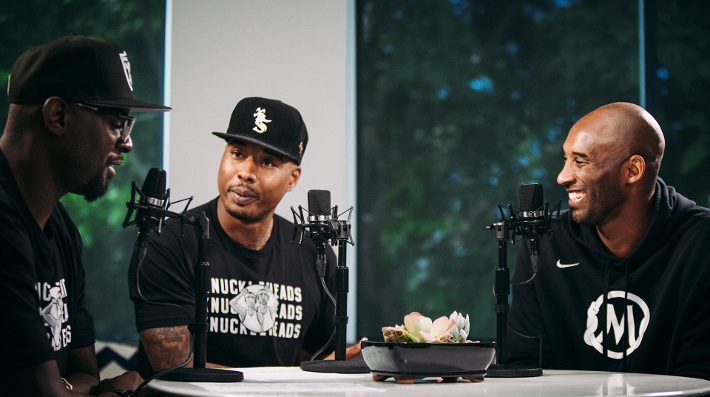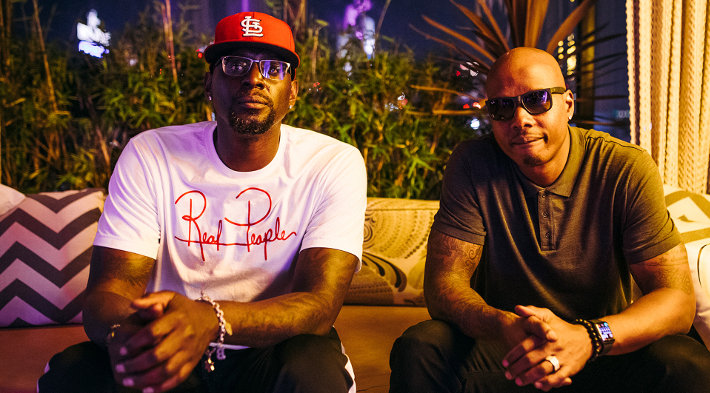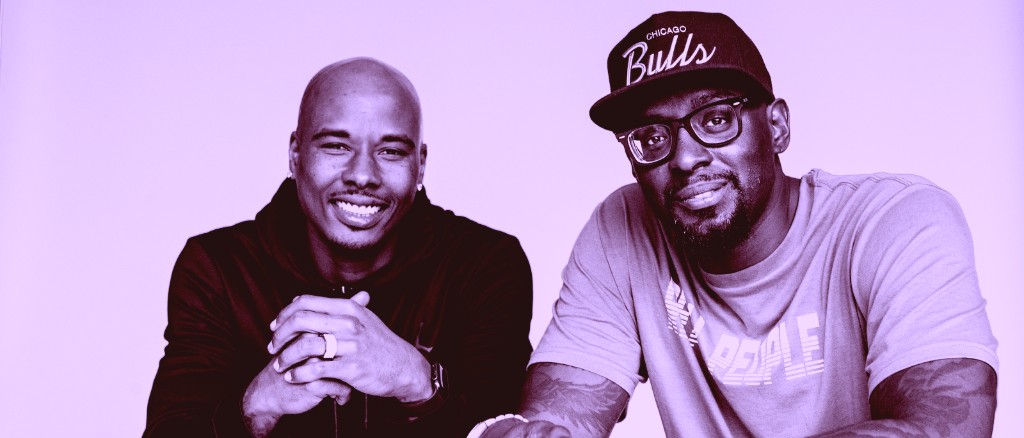In just two short years, the Los Angeles Clippers have closed the book on the Lob City era and hit the turbo boosters on the next phase of their evolution. The flawed but scrappy group they pieced together last season became the early darlings of the playoffs when they pushed the Warriors to six games, then followed that up by staging the biggest coup of the summer in landing both Kawhi Leonard and Paul George. Now, they have a championship in their sights.
This is just the latest iteration of a franchise that’s undergone multiple transformations over the past two decades. With Chris Paul, Blake Griffin, and DeAndre Jordan, the Clippers were one of the NBA’s hottest tickets, churning out highlights on a nightly basis but ultimately falling short of their goal of competing for a title.
But long before Lob City put L.A.’s second team on the map, an even earlier prototype made up of Darius Miles, Quentin Richardson, Corey Maggette, and Lamar Odom set the NBA on fire at the turn off the century and cleared the way for successive generations. That squad never had a chance to reach their full potential, but the flair and excitement they brought was undeniable, and it still lingers to this day.
Those guys are all retired now, but two of the central figures, best known as “Q” and “D-Miles,” have brought that love for the game and their insider knowledge of the NBA to their hit Players’ Tribune podcast, “Knuckleheads” (a nod to their signature celebration). They’ve had everyone from Kobe Bryant and Kevin Durant, to Gary Payton and Allen Iverson, with each conversation offering a unique and intimate look into the lives and careers of the league’s most compelling stars.
We caught up with them recently to talk about the pod, their former team, who their dream guests are, and just how much the league has evolved.
Almost from the start, you guys seemed like naturals at this whole podcasting thing. Darius, you’ve said before that you were a little reluctant at first, that you didn’t like being in front of a microphone. What is it that makes you guys so comfortable in this platform and able to create such a natural environment? Did that just come from being such long-time friends, or what do you do to maintain that laid-back vibe?
Darius Miles: For me, it definitely sets the tone for that. I just know I have to do something uncomfortable to start opening up, like coming out the box, just trying to do new things. That’s what it is for me.
Quentin Richardson: Yeah, man, I think that us doing it together absolutely gives us a comfort zone right off the bat. It’s just me and him doing it. It’s our show, and that whole part of it, that aspect of it, that gave us a comfort zone, what the vibe with the players should be on there, and knowing who we were working with, and this was going to be all for the players. That was what our relationship was based on. That made it a lot easier, as well.
Are you guys podcast junkies? What are some of your favorites?
QR: To be honest with you, man, before we started doing this, I didn’t even really know what podcasts were. I was not into them like that. I had did like that little, I guess you would call it, a trial run with the Players’ Tribune during the Finals, or with doing some stuff with Jared Jeffries and Al Harrington. Outside of that, man, I was unaware there were so many of them. I didn’t have a clue that it was that big of a deal. I didn’t even notice the icon on the iPhone. Me and Darius were like, what if we’re going to suck at it? We weren’t up on the podcast game like that at all.
With the Players’ Tribune, you have both audio and video. Do you like having that video component as well?
QR: Yeah, I think that’s important, for us and for our viewers to get to see. It’s more like a glimpse into, you can just see some of the reaction and stuff like that that don’t really come across all the time on audio. I think for them to get a chance to see a lot of that just ties everything in with culture, seeing what the guests maybe are wearing or whatever shoes and all those little different things like that. Kind of ties it all into what we’re trying to bring to the table.
I love the way you start each pod by asking everyone who was the first person that busted their ass when they first got into the league. It sets the tone immediately. A lot of guys want to come off as being cool and etc. Why is it important for you to get your guests to let their guard down a little bit and be a little more authentic?
QR: I think the dopest part about that is that was totally a D. Miles thing that he kind of kept trending. When he first did it, I think he did it a couple times in a row. I remember somebody asked him, “Man, are you going to ask that every time?” He was like, “Yeah, yeah.” Because it kept going, all the viewers and the people in the comments and people even coming up to us when they would see us like, “That’s the same question on the show.” It was like, yeah. He did good that he did keep doing it because it’s definitely what everybody looks forward to hearing from every single guest. It doesn’t matter who you are, what level you play…even if you’re the best, Michael Jordan, somebody bust MJ ass at some point. If you’re playing pro, playing hard, somebody tuned you up at some point. So you can ask anybody that.
DM: Every night, you just don’t be the best player. You know what I’m saying? That goes for All Stars, Hall of Famers, whoever you are. There be that one night or that one time that somebody got the upper hand on you. I thought it was a good question to ask. People try to give the unexpected answers, to kind of give props to other players that people weren’t even giving no props to.
Yeah, I love the unexpected answers. I’m trying to remember who it was who said Jose Calderon. Was it Kyrie?
QR: Kyrie.
DM: Yeah, Kyrie.

You’ve had some big names on the show already: Kobe, D-Wade, Gary Payton. You’ve mentioned before that MJ would obviously be a dream guest. Who are some others you hope to have on in the future?
QR: At this point, I don’t think we want to say any more names because we got a lot of people teed up. I mean, I would rather say we are overwhelmed with the love we’re receiving and the reception from almost all the people that we’ve reached out to. We want to show love after the show. The love has been reciprocated. I mean, I think that’s the biggest thing that we want to get across to everybody who’s rocking with us and that’s willing to come on and do our show. We more than appreciate the love and are overwhelmed by the response that we got because we definitely didn’t expect it.
DM: I want these names out there, though…
Perfect!
DM: We need Obama. We need Jay-Z. Them are far-fetched, but I definitely would love to have them on the show.
One of the things I like so much about your dynamic is that I still feel your sense of joy and wonder about just what an amazing journey it’s been being in the NBA. What’s been the key for you to stay grounded like that?
QR: For me, man, that reflects the way I was raised. My family and my inner circle and my group around me, they never treated me different. They never treated me like, “Oh, now you’ve done this, or now you’re this.” No, I’ve always been regular old Q. It’s great that I made the NBA. “You made money. You’ve done all these things,” but at the same time, they’ve always held me accountable for the way I am and the way I carry myself. That’s what’s always kept me the way I was.
DM: We’re the same way. Where I’m from, it was the bottom when I came up, and it’s still the bottom to this day, and until now I still have family members that I still see struggle at home. It humbles you no matter where you go and how far you go.
Darius, in your Players’ Tribune article from last year, you talked about struggling with depression and things like that. We’ve seen guys like Kevin Love and DeMar DeRozan and other people be more open about it and more willing to speak publicly about it. Did you feel that it was important to get that out there for other folks who might face similar struggles?
DM: I really wasn’t specifically trying to point out depression and so forth. I was kind of just telling people what I went through. I really wasn’t trying to get into everything else about how deep it is, but the reception coming from that, it was like people was going through the same thing, and it kind of turned into that. But I definitely think with the NBA having mental health doctors for these teams and all that stuff, I definitely think it’s well-needed. It should have been in place, but people don’t know. It’s hard to kind of change something that’s working so good, to add onto it.
QR: I think I would agree with him. I think it’s amazing that steps is being taken and that things is being put in place from the NBA. The NBA’s always been great about being progressive about all those things, especially once you hear from guys like DeMar and Kevin Love come out and shine a light on it, and how the NBA responded.

I had a chance to speak with Ramona Shelburne recently about “The Sterling Affairs” podcast. Both of you guys participated in that. Why did you think it was important to shed light on how some of those things played out during your time with the Clippers?
QR: When she reached out to us and she wanted to talk, I was not opposed to it. I mean, I’m telling my truth about the situation. I was fortunate that I wasn’t there when everything really went on, when it got crazy and stuff. In the four years I was there, the incidents were more comical to us. It was nothing ever that serious. I mean, obviously, the backdrop of a lot of his real estate dealings was going on and things like that, but as far as the direct effect on the team, like I said, we had lighthearted stories about him bringing groups of people into the locker room maybe after some games or things like that, which was kind of inappropriate, but we never really had anything serious or crazy about what happened while we were there, fortunately. It’s more directly with us and the team.
DM: Yeah. I agree with you. It really wasn’t nothing bad that we had to say about him. It was more comical. We was kids. He was just…it was weird on certain things. We didn’t know to the extent of how it was. We thought what he showed us and being on that team, it was better than what we ever experienced. But we seen other teams that had better facilities and stuff, but we didn’t… that wasn’t a priority for us.
Fast-forward to this summer, obviously the Clippers had a huge off season adding Paul George and Kawhi Leonard. What were your reactions when you saw that, in terms of thinking about your former team and how far they’ve come now?
DM: Yeah, I was very excited for them. I still got the energy and excitement for this season. I think just being there and knowing where it was at, to see where it’s at now is definitely a blessing. It’s amazing to watch, to be a part of that organization at some point, to see them get two big superstars. It’s about time.
QR: I agree, man. The entire total makeover is amazing. When we were there, we practiced at a junior college, Southwest Junior College. Now you look at what Ballmer’s done coming in and his plans to build this amazing arena in Inglewood and do so much for the community there. Just for them to be mentioned amongst the top teams and having a chance to be in competition for a title, that’s amazing for them. The best part is for those guys and those people that’s worked so long in the organization during all those bad times, and also for the fans out there and through all that, they finally can really cheer for a team that they really an believe has a true chance at achieving something.
Social media is such a big thing now in the NBA. How would that have made life different for you in your day, and how do you think that affects these guys coming up today?
QR: I couldn’t have even imagined. The way that everything is on social media now, it wouldn’t have been as fun as it was for us. Me personally, I know Darius, we’re not the type of people that tweet and post locations and where they at and what they going to do. We were never those type of people anyway. But I think it has its pros and cons. I think we could have been social media superstars. We was 18, I was 19, and we were LO (Lamar Odom) and Keyon (Dooling) and Corey (Maggette), we were absolutely part of the culture of that generation at that point. I think that could have translated in a great way as well, but I think there were obviously some pitfalls that were waiting because when this social media thing first took, I mean, we saw everybody having hiccups and little false starts because everybody didn’t know how to use it and how powerful it was and how far it went and those different things. I think it’s a pro and a con to it.
For the young guys, I think the biggest difference is, you got the locker room stuff. You see the first thing they do when they come inside. They go check their phones. It’s a natural thing. It’s like the phone kind of dominates you. I mean, that’s not just being an athlete. That’s just the world right now. You go to any restaurant, it’s all you see.
But I mean now, as far as the generation playing today, guys want to team up and join each other. Guys weren’t doing that, so now you have those differences, but I mean me, I’ve been a fan of every era, before I got in the NBA, when I was in the NBA, now that I’m out of NBA. I’m always going to be a fan. I don’t judge these young guys. What’s in front of them is no different than the generation before us or no different than our generation. We all dealt with things right in front of it. They’re just handling things as they come.
(This interview has been edited for length and clarity.)







